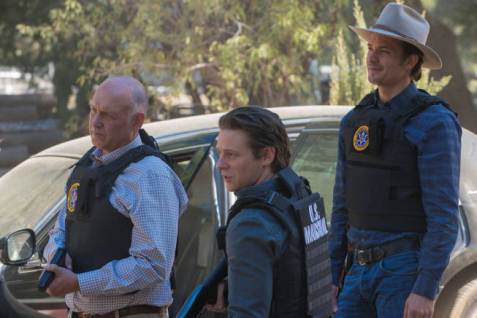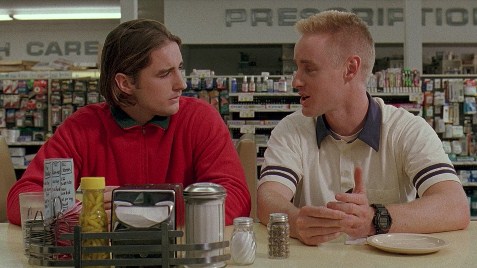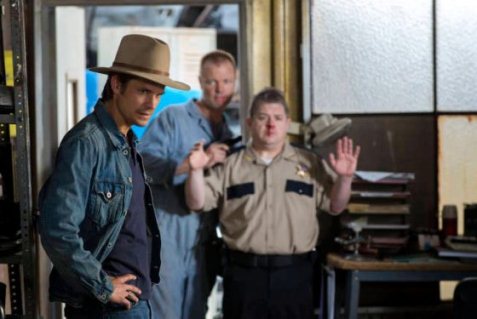SPOILER WARNING: This post will appear following a new episode of “Justified.” It is intended to be read after seeing the show’s latest installment as a source of recap and analysis. As such, all aspects of the show up to and including the episode discussed are fair game.

The second episode of Justified’s fourth season didn’t offer much in the way of action. You probably could’ve watched it with a blindfold on and not missed out on much. That’s not to say it wasn’t entertaining, however. In fact, quite the opposite. There’s little on television more entertaining than a trademark Boyd Crowder speech, and his verbal battle with preacher Billy will likely be remembered as one of the best scenes in the series’ history. It was also a reminder that Walton Goggins is one of the past decade’s best character actors. While he’s finally getting rewarded with roles in big-time movies like Lincoln and Django Unchained, between Shane Vendrell and Boyd Crowder, how he hasn’t won a single Best Supporting Actor Emmy (and has only one nomination) remains a mystery to me.
Leading up to that confrontation, Billy and the Crowders poke and prod at each other from afar, mostly using Ellen May as a conduit. It starts when the easily convinced hooker shows up to tell Ava about her conversion, quoting “Palms number 62.” Ava is quick to ensure the fear of Crowder outweighs the fear of God by reminding Ellen Mae that she was the one who “saved her soul.” So Ellen Mae mopes back to the Last Chance Holiness, only to be converted yet again.
Up to that point, Boyd remained casually detached from the situation. He’s got more pressing concerns, namely finding someone to blame for the decline of his oxy sales. Cousin Johnny, determined to ensure that someone not be him, is quick to point the finger at Billy and his church. Boyd meets the idea with skepticism, however, noting that people in Harlan County “party Friday and Saturday and get saved on Sunday.” He doesn’t think one more church is going to change that, and declines Ava’s suggestion that they go see what all the hubbub’s about, stating that he “doesn’t like churches” (no doubt because of the way his own stint as an evangelist ended). But Billy gets Boyd’s attention by sending a group of hymn-singing children into his whorehouse, scaring away customers.
Though Sheriff Shelby insists Billy’s history of moving from one destitute small town to the next suggests he’s nothing more than your run-of-the-mill pulpiteer, Boyd reads a different story between the lines: The St. Cyrs (Billy and his sister, Cassie) keep their tent tied down just as long as it takes to bring enough addicts, whores, drunks, gamblers and other characters of ill repute into the fold. When the leaders of the local criminal element notice their revenue streams drying up, Billy and Cassie make a simple proposition: Pay up and we’ll be on our way. It remains to be seen what the St. Cyrs’ motivations really are. It seems more likely that a drop-off in oxy sales could have more to do with Dixie Mafia heroin dealers “accidentally” moving into Crowder turf, and that Boyd’s giving the St. Cyrs all that credit because that’s the way he would run that hustle. It’s just too early to tell, the possibilities are endless.
Anyway, all this leads to that ultimate showdown of the orators. The preacher vs. the ex-preacher, the sinner vs. the saint. The two trade bible verses, and Billy talks a lot about helping the wicked to see the light. Boyd turns that around though, pointing out the hubris inherent in the preacher’s willingness to pass judgment on those he does not know. Then he goes on the offensive, calling Billy a “false prophet” and begging the congregation to “test the spirits!” He says Billy goes from town to town, taking people’s hard-earned money and giving them nothing but empty promises in return. Billy’s counter is a surprising one, he says the church will no longer pass out collection plates, a smile never leaving his face. The same cannot be said for Cassie.
At first glance it appears Boyd has to chalk up a rare tally in the loss column. But, when Colton says, “that didn’t go so well,” Boyd responds, “Actually, Colton, I think we got exactly what we came here for.” See, Boyd’s always playing the game on a few different levels, using his bravado to mask his cunning. Boyd wasn’t in that tent on a search and destroy mission, but to gather intelligence. And not just about Billy, but the full extent of the problem, the individual members of the congregation, and everything he can exploit or use to his advantage. Most importantly, he learned that while Billy’s the one behind the pulpit, the charismatic face of Last Chance Holiness, Cassie’s running the show from behind the scenes.
Meanwhile, Raylan and company take the first steps towards unraveling the season’s big mystery, going in search of Waldo Truth, the name on the driver’s license found in the Panamanian diplomatic bag in Arlo’s wall. That included another fantastic scene in which Raylan, Tim, and Art get into a standoff with the Truths, an entire family of Dickie Bennetts. The Truths, of course, fail to see the irony in their gun-toting, “go ahead and shoot,” intensely anti-“gov’ment” attitude, all in an effort to protect the “draw” delivered to them from said “gov’ment.”
In contrast to the hotheaded younger Truths, however, is their matriarch, who calmly invites the Marshals in to sort things out. Eventually, “Waldo” returns home, but not really, as we soon discover. The man is an impostor, posing as Waldo Truth so that the family could continue to receive his benefit check. While Raylan’s ready to haul in every last one of them, Art decides to let them go once the information they offer helps him connect a few dots between their current predicament and an intriguing case from his early days as a Marshal. It’s now certain the man who fell out of the sky with all that cocaine was the real Waldo Truth, who disappeared with a pilot named Drew Thompson decades ago.
The episode brought some connection between the previously disparate Boyd and Raylan/Waldo Truth storylines with the return of Jere Burns as Wynn Duffy, who arrives in Harlan to deal with the dealer who wandered into Boyd’s turf. Duffy, who’s apparently been made a little colder by the time he spent with Robert Quarles, promptly shoots the dealer in the head. Boyd attempts to seize an opportunity by offering to partner up with Duffy in bringing heroin to Harlan County. Duffy turns him down saying, “I don’t even trust the way you just now said I could trust you.” But, before he leaving, he asks Boyd what he knows about Arlo offing a Dixie Mafia soldier, which, at the moment, is nothing. Boyd’s now a dog with a scent, he’d probably want to know what Arlo’s deal is just to know, but now he’s got the added incentive of proving he’d make a good partner to Duffy. Now we’ll get to watch as both Boyd and Raylan uncover the clues of the big mystery separately and on opposite sides of the law. That’s good news for us viewers, because we’ll get to see it all.
Check out the preview for next week’s episode below and follow the writer on Twitter @NateKreichman.
You can follow us on Twitter and Facebook for content updates. Also, sign up for our email list for weekly updates and check us out on Google+ as well.
Posted in: Television
Tags: Arlo Givens, Ava Crowder, Billy St. Cyr, Boyd Crowder, Chris Chalk, Colton Rose, Ellen Mae, Elmore Leonard, Jere Burns, Joelle Carter, Justified, Justified Blog, Nate Kreichman, Raylan Givens, Raymond J. Barry, Ron Eldard, Sheriff Shelby, Timothy Olyphant, Walton Goggins, Wynn Duffy














